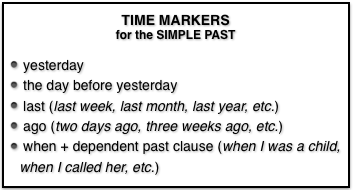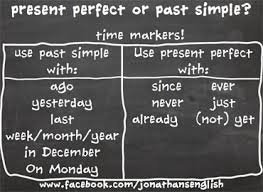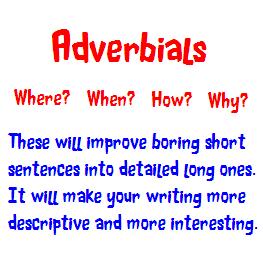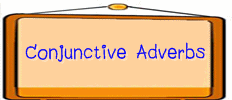¤ Adverbs_of time ⇔ [quiz] ⇐
¤ Adverbs of frequency ↓ Position . . .
… always, usually, regularly, normally, often, sometimes, occasionally, rarely, seldom, hardly ever, never . . .
• before the main verb
| Adverb of frequency | Verb | |||
|---|---|---|---|---|
| I | always | get up | at 6.45. | |
| Peter | can | usually | play | football on Sundays. |
| Mandy | has | sometimes | got | lots of homework. |
• after a form of «be» (‘am’, ‘are’, ‘is’, ‘was’, ‘were’)
| Verb | Adverb of frequency | ||
|---|---|---|---|
| Susan | is | never | late. |
The adverbs ‘often’, ‘usually’, ‘sometimes’ and ‘occasionally’ can go at the beginning of a sentence.
Sometimes I go swimming.
Often we surf the internet.
Sometimes these adverbs are put at the end of the sentence.
We read books occasionally.
¤ Here are some other expressions we can use to say ‘how often’. All of these longer phrases go at the beginning or the end of the sentence but not in the middle.
- once in a while: I go to the cinema once in a while.
- every now and again: She drinks wine every now and again.
- from time to time: From time to time I visit my mother.
To say how often something happens, you can use a number (or ‘several’), followed by ‘times’. If the number is one, use ‘once’ instead of ‘one time’. If the number is two use ‘twice’, instead of ‘two times’) Then add ‘a’ and a period of time:
- I go to the cinema twice a week.
- She takes these tablets three times a day.
- I change the sheets once a fortnight (fortnight = two weeks).
- I meet him several times a year.
- I visit my parents once a month.
We can also use ‘every’ + period of time:
- every … morning / day / Tuesday / week / month / summer
•→ QUIZZES . . . →[01]← / →[02]← / →[03]←
* * *
¤ . . . more ADVERBS of TIME
• Fill in the gaps … ⇒’STILL’-‘YET’-‘ALREADY‘ ⇔ ‘STILL’-‘YET’-‘ANY MORE’⇐
♦ Past Simple Time Markers ↓
◊ Time Expressions Used With The Present Perfect Tense ↓
•→Time markers associated to tenses ⇓
• → SCALE OF AMOUNT ⇐
¤ To what extent?
This adverb can modify an adverb or an adjective and comes before the word it modifies:
«The bottle is almost full, nearly empty.»
«They should be able to pass their exams quite easily.»
The following adverbs of degree can also modify verbs: almost, nearly, quite, hardly, scarcely, barely, just
They follow the same pattern as frequency adverbs in terms of where they are placed:
«I quite understand.»
«We had almost reached the hut when the rain started.»
«I am just beginning a new course.»
∞ Intensifiers & Downtoners: ⇒ [vid] ⇒ Mitigators ←•
•→Informal intesifiers ⇐[vid]
⇒ ‘very’ vs ‘too’ ⇐[vid]
⇒ Place ⇔ … Adverbials … ⇔ …Manner ⇐
• Try this test→VIEWPOINT & COMMENTING ADVERBS⇐
. . . Before you do, you might like to visit this web_site ⇓
→www.edufind.com/english/grammar/adverbs_viewpoint_comment←
It displays a good summary of such expressions, ↑ which are widely used by English politicians and reporters. They consist of long words adding rhythm, fluency and cohesion: often making you sound more ‘brainy’ (‘pedantic‘?) As they most frequently occur at the beginning of a statement, they give us some extra time to think what we’re going to say next…
. . . Native speakers often make it even l o n g e r :
‘Oddly enough…’ / ‘Fortunately enough…’ / ‘Wisely enough…’
‘Most unfortunately…’ / ‘Most surprisingly…’ / ‘Most understandably…’
Spaniards never feel confident with such long words of Latin origin though, which is definitely a shame: we know so many!
♦ Intensifying Adverbs ↓ [collocations]
•→http://grammar-teacher.com/adjective-intensifiers⇐
∞ Adverbials_function & structure … ⇒[vid #1] ⇔ [vid #2]⇐
¤ Adverb placement / Position of adverbs … ⇒[01] ⇔ [02] ⇐
• Inversions with adverbials… ⇒ [01] ⇔ [02]⇐
◊→ ‘JUST’ ⇓ [meaning & use]
1. Exactamente
It’s just what I wanted!
Es exactamente lo que quería!
It’s just as I thought!
Es exactamente lo que pensaba!
2. Igual de (just as good, nice, etc)
He’s just as attractive as his brother.
El es igual de atractivo que su hermano.
You’re just as good as anybody.
Eres igual de bueno que cualquiera
3. Acabo de (hacer algo)
I’ve just arrived home.
Acabo de llegar a casa.
I’ve just finished work.
Acabo de terminar de trabajar
4. Solamente
I just needed a drink.
Solamente necesitaba un trago.
I just want to talk to you for five minutes.
Solamente quiero hablar contigo cinco minutos.
5. Justo (en este momento)
I’m just finishing my homework.
Estoy acabando mis deberes.
I’m just off.
Me voy ahora mismo.
6. Simplemente
It was just not my lucky day.
Simplemente no fue mi día de suerte.
7. Completamente
Lunch was just delicious!
La comida fue completamente deliciosa!
* Another example not included in the video:
8. when ‘just’ means ‘justo’/’justa’:
I am fighting for a just cause.
Estoy luchando por una causa justa.







Deja un comentario